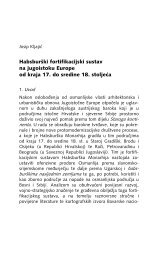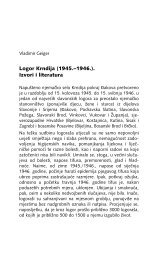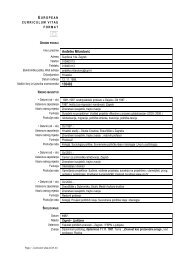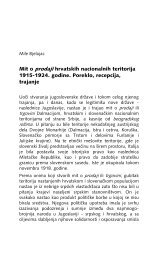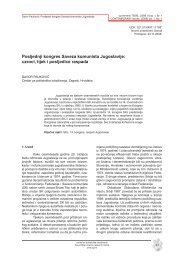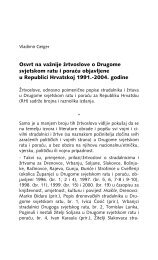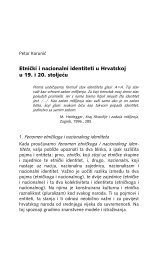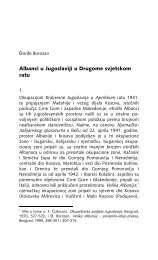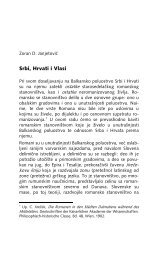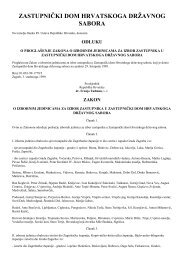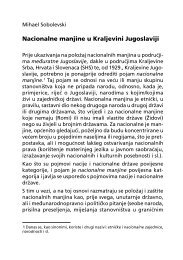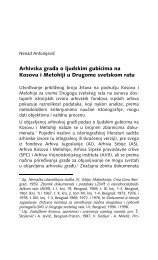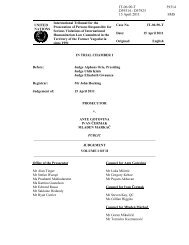ISSN 1847-2397 godište II broj 1 2009. | volume II number 1 2009
ISSN 1847-2397 godište II broj 1 2009. | volume II number 1 2009
ISSN 1847-2397 godište II broj 1 2009. | volume II number 1 2009
- No tags were found...
Create successful ePaper yourself
Turn your PDF publications into a flip-book with our unique Google optimized e-Paper software.
Plamena Pehlivanova: The Decline of Trust in Post-Communist Societiessuvremene TEME, (<strong><strong>2009</strong>.</strong>) God. 2, Br. 1CONTEMPORARY issues, (<strong>2009</strong>) Vol. 2, No. 1On the other hand, we observed the increasein social antagonism as a result of growing inequalityand dissatisfaction with life in society.This section will try to further focus on the levelsof trust that society reports and how does insideand outside group trust affect participation andthe development of society. Who do Bulgarianstrust? Why? And where do they spend most oftheir leisure time?“Our Circle” became a common phraseused during the Thaw period in Russia and inBulgaria, where tight circle of family and friendswould meet and discuss shared ideology andopinions. The family structure, which was predominantlynuclear, helped in the establishmentof tight bonds and facilitated the creationof strong social capital among its members. Ina way, the circle generated the micro-level trustwhich has declined towards the state in the lastyears of the regime. Through tough political andeconomic transitions, the Bulgarian society witnesseda decline of the social ties that existedduring communism. The social inequality andthe later emergence of “dirty money” and corruptiontriggered the disintegration of society, whichled to social alienation and loss of institutional legitimacy.The older generation in particular tendsto express suspicion and negativism toward thenewly rich. Inequality and miserable financialstatus of most elderly in Bulgaria has proven toaffect their social and political trust levels. Frommy personal observations of the older generationin Bulgaria, it seems that the elderly haveisolated themselves within a very limited circle offamily and friends who have earned their trust.It can be argued that the family substitutes therole of the institutions as it provides for value prioritiesand moral resources for one’s realization.Contrary to the Tocqueville and Putnam model,I propose that in Bulgaria and Russia, such personalrelations generate trust and intermediaryorganisations do not.Relevant to the WVS study of “Participationin Voluntary organisations”, (Table 4),the survey based on “Spending of leisure time”analyses where and how people spend theirtime. According to Terry Clark, unofficial socialinteractions, such as consumption, generate astrong social capital (Clark, Achterberg, Navarro2007: 11). In this sense, based on the survey on“spending leisure time” we could analyse whereand how people interact and hypothesize howsocial capital is constructed in the different countries.From this table presented by the WVS,we can see that in contrast to the United States,more than 70% of the interviewed from China,Russia and Bulgaria report to “not at all” spendtheir time in sports, cultural or communal organisations.When we add the variable of “age” tothe table, we see that in Bulgaria (1999) 55%of the people over 50 years of age don’t spendany time, while 45% of the younger spend theirtime weekly in such organisations,. On the otherhand, in Russia (1999) - 60% of the 30-49 yearolds don’t spend any time, but 65% of the youngerinterviewees spend their time weekly in communalorganisations. Why is there such a generationalgap? What makes the older populationTable 4Spending of leisure time: “How often do you spend time with people atsports, culture, communal organisations?”CountryNot at allOnly a fewtimesOnce amonthWeeklyBulgaria 70% 7% 11% 10%China 85% 9% 2% 2%Russian Federation 75% 10% 5% 6%United States 25% 26% 24% 20%* World Value Survey (1999)centar za politološka istraživanjathe political science research centrewww.cpi.hr40



